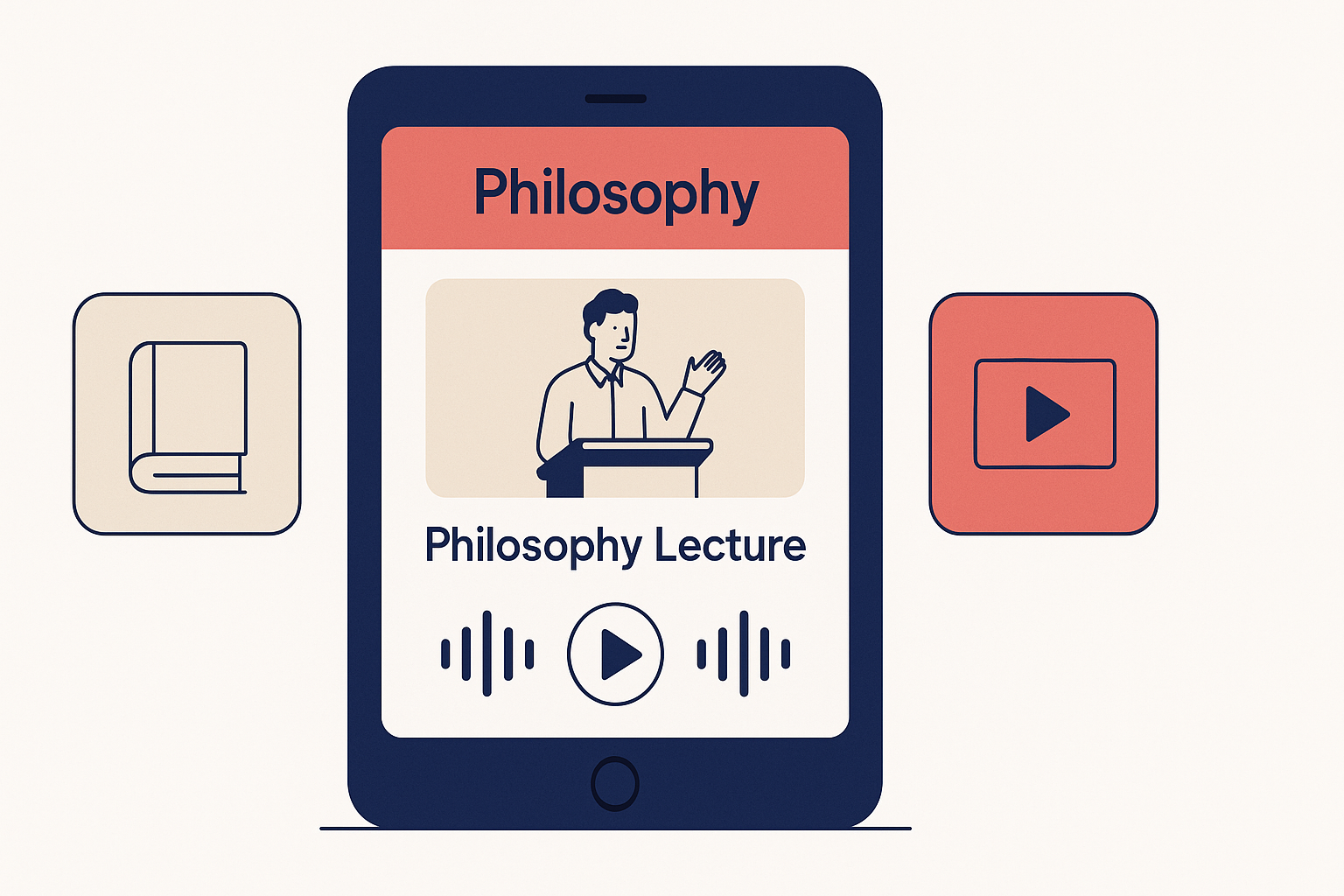The Best Philosophy Lecture App to Learn Anywhere

If you’ve been searching for the best way to publish and access philosophy lectures, courses, and audio lessons online, you’re not alone. Many individual educators, university departments, and independent creators struggle to make philosophical content available digitally in an organized, mobile-friendly way. Traditional tools don’t always provide the flexibility or branded control that institutions or creators need. That’s where Audiorista comes in. As a no-code platform, it makes it simple to launch a fully branded app for philosophy lectures, stream or host courses, and create audio lessons—all in one place. This article explores how to use a philosophy lecture app to deliver structured courses, audio-based learning, and live university lectures for learners at every level.
Why a philosophy lecture app is the future of learning
Philosophy education has long been rooted in lectures, seminars, and extensive reading lists. But with the growing need for flexible and mobile-first learning, educational institutions and individual instructors are looking for better ways to distribute philosophy content digitally. A dedicated philosophy learning app streamlines this process by aligning with today’s online learning habits and removing barriers to access.
Instead of relying solely on in-person formats or scattered online uploads, a philosophy lecture app acts as a centralized hub where educators can package and deliver content in multiple formats. For learners, this means they can conveniently stream, download, or listen on the go.
- Stream full philosophy lectures
- Offer downloadable audio lessons
- Mobile-friendly design for students
Building a philosophy course app without coding
One of the key benefits of using Audiorista is its entirely no-code approach. Educators don’t need technical teams to design or launch a professional-grade course app. With Audiorista, it’s possible to create structured course modules that include audio lectures, video explanations, and supporting text without writing a single line of code.
For philosophy courses in particular, this solves a major challenge. Whether it’s a full series for beginners covering foundational thinkers or advanced-level courses on epistemology, these lessons can be packaged into clear modules. Educators and institutions gain full control over branding, access, and layout while keeping the process efficient. This design flexibility works equally well for individual instructors offering independent classics of philosophy lectures or university professors extending formal curriculum into mobile apps.
Another advantage is monetization. Rather than giving away all content for free, educators can easily package their lessons into a sustainable subscription model. If you’d like to explore this further, Audiorista explains step by step how to turn your online course into a subscription-based app, ensuring your philosophy lectures generate lasting value for both learners and instructors.
Philosophy audio lessons and podcast-style learning
Balanced against long-form lectures and video courses, audio lessons play an increasingly important role in philosophy education. Many learners prefer to consume philosophy lectures the same way they’d listen to a podcast—while commuting, exercising, or doing daily tasks. This demand has fueled the growth of audio-based education formats that fit into students’ lifestyles without requiring them to sit in front of a screen.
With Audiorista, instructors can structure philosophy audio lessons into thematic collections. For example, one series may focus on ethics, another on metaphysics, and another on logic. This approach makes it simple for learners to dive into the specific branch of philosophy that interests them most, while still providing a consistent user experience across lessons. Audio-based delivery is not a compromise—it’s an enhancement that brings the subject closer to students in ways they can actually integrate into everyday life.
Live and on-demand lectures with a university lecture app
For universities and academic institutions, the value of a lecture streaming app is even greater. A university that wants to extend the reach of its philosophy department can use Audiorista to make lectures available in real time through live streaming, or on-demand via high-quality playback. Instead of confining philosophy instruction to a physical room, institutions can reach learners worldwide, both current students and lifelong learners.
This is where video integration becomes essential. Audiorista offers a complete video app builder for lectures that allows schools or educators to combine live teaching sessions with recorded archives, ensuring learners get the full benefit of both formats. Professors can present a dynamic live philosophy lecture and later repurpose that same content as a reusable lesson within the institution’s app. This single workflow dramatically enhances accessibility while preserving academic quality.
Benefits of using Audiorista for philosophy education
A philosophy lecture app brings clear benefits to both instructors and learners when built on Audiorista’s platform. Instead of scattering content across multiple websites and tools, all resources are unified and presented in a single branded educational hub.
- Centralized content in one app
- Branded platform with no coding
- Video, text, and audio integration
- Subscription and monetization options
This combination of accessibility, format variety, and revenue opportunities means that philosophy education can scale far beyond traditional formats. Learners get a professional-quality app that works seamlessly across devices, while educators and institutions can sustain their work with data-driven engagement tracking and flexible monetization tools.
Start building your own philosophy lecture app today with Audiorista—no coding required, just upload your lectures and share them with learners everywhere.


